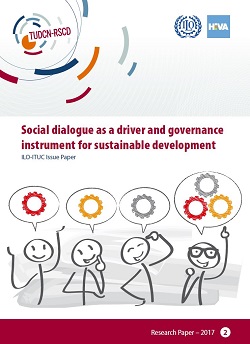 The relevance of social dialogue to sustainable development
The relevance of social dialogue to sustainable development
Bringing workers’ and employers’ representatives together in a formalised exchange when making decisions that concern them, is a successful governance approach. It delivers policies that are the fruit of consensus and work for the social actors. The broader benefits of social dialogue are well documented and it has been integrated into decision-making processes in many countries.
Bridging the gap between this body of knowledge, rooted in experience, and the implementation of sustainable development is highly relevant to the achievement of the Sustainable Development Goals (SDGs). This paper, entitled Social Dialogue as a Driver and Governance Instrument for Sustainable Development, presents concrete examples of how social dialogue implements three principles that are at the heart of the Development Effectiveness Agenda: inclusiveness, democratic ownership and accountability.
What is needed for social dialogue to make a contribution?
In order for social dialogue to deliver these benefits, certain conditions must be met. Firstly, social dialogue has some requirements in order for it to be effective. These vary according to the context. They are detailed for both national and workplace level social dialogue.
Among the national requirements, the paper includes the upholding of freedom of association and collective bargaining rights, the presence of strong and representative workers’ and employers’ organisations, trust amongst the tripartite actors, appropriate funding, clear-mandate setting and continuity. In addition to ensuring that effective social dialogue is in place, the paper also details the requirements for social dialogue to contribute specifically to sustainable dialogue discourses.
What is known about the contribution of social dialogue to sustainable development?
The inclusion of social partners in decision-making is shown to give working people a say in policies that affect them directly and result in a deepening of democracy. In addition, evidence suggests that social dialogue is an effective way of promoting collective problem-solving, that it builds consensus which in turn eases policy implementation and that it provides an avenue for justification and feedback on actions undertaken.
The Sustainable Development Goals are used as the basis for the assessment of the contribution of social dialogue to sustainable development. The paper bases its assessment on evidence from concrete examples from a broad range of national contexts. It identifies five thematic clusters through which it presents key mechanisms of the social dialogue contribution:
- Working conditions, workers’ rights and equality at work
- Access to public goods and redistribution
- Growth and innovation
- Environment and climate
- Governance and participation
Examples from various different contexts are provided to illustrate contributions within these clusters. Additional detailed case studies are available in our Social Dialogue for Sustainable Development in Uruguay, Ghana and Indonesia study.
Way forward
There is a need for an interdisciplinary research agenda to begin to address some of the key knowledge gaps that are preventing social dialogue from achieving its full potential in promoting sustainable development. This requires a better understanding of how social dialogue works in different contexts and settings. Greater efforts should be made to examine how the necessary preconditions can be established through targeted support efforts designed to improve the effectiveness of the contribution of social dialogue.
Key questions emerge from this work that are of major relevance to sustainable development efforts. They highlight the need for a discourse of the benefits of social dialogue to the informal economy, to fragile states, global supply chains and the Just Transition.
The full Issue Paper is available here. FR ES
Further information:

